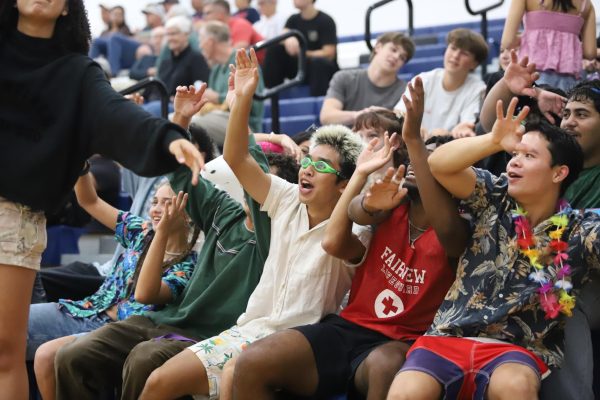Tinkham hones passion for beekeeping
Used with permission by Wyatt Tinkham
Junior Wyatt Tinkham poses with his new bee hive after completing a hive check.
March 23, 2022
One hundred and fifty thousand. One hundred and fifty thousand bees call junior Wyatt Tinkham’s backyard their home. Tinkham began to keep bees after his dad took it up as a hobby a few years ago.
“My dad started [keeping bees] and he was super into it. I helped him a little bit [and] now I am getting more into it and I am looking at getting my own hive soon,” Tinkham said.
At first, Tinkham and his family were unsure if they wanted to take on the responsibility of caring for bees.
“My mom didn’t like it at first and didn’t want anything to do with it. Once, she did a hive check and now she likes them too,” Tinkham said. “It’s really cool because a lot of people are scared of bees then they do a hive check and see how it works and they think it is cool afterwards.”
As a beekeeper, Tinkham must perform daily tasks to keep up with his hives.
“[The bees] are pretty well self maintained. You have to check the hive once a week in the summer and make sure that everything looks good and the queen is laying eggs,” Tinkham said. “In the winter, they are on their own for the most part; they just go dormant.”
In order to complete a hive check, Tinkham can choose to wear protective gear to avoid getting stung.
“The suits are white because bees don’t associate white with any predators, so they don’t think their hive is getting raided. The suits are baggy, so you can’t get stung through the suits. Most of the time they are optional and I don’t even wear a suit when I do a hive check,” Tinkham said. “It is really your comfort level. They are mostly there so you don’t get stung.”
Hive checks consist of smoking the bees out of the hive to ensure the colony is progressing at a steady rate. Hives checks occur once a week during the summer.
“We put smoke in [the hive] to make them think there is a forest fire. When we are doing a hive check we are making sure they have enough honey to eat and that they are laying eggs so the population can still grow,” Tinkham said.
Tinkham’s backyard is currently home to three bee hives. Each of them houses approximately 50,000 bees. Tinkham has learned how to take care of his bees and to successfully get honey from his colony.
“It’s just enjoyable to know you are maintaining your own colony and it’s cool to just see your own hive of bees and your honey. We collect a lot of honey, we got like five gallons from one hive this year,” Tinkham said.
In order to extract the honey from their hives, Tinkham must spin the frames from the hive.
“There are a lot of ways to [extract the honey]. We take the honey out of the frame in the hive and we have this machine that spins the frames and uses centripetal force to pull out all the honey,” Tinkham said. “We then collect it in jars.”
After he collects the honey, he is able to store it for a while before selling.
“We collect anywhere between 5-7 gallons, but that is because our hives are newer, so the population is lower. With a lot of hives people can get between 10-15 gallons of honey per hive,” Tinkham said. “We normally sell or use [the honey]. We have a lot of honey in our basement. Honey never expires, so we can store it if we are not selling it or using it.”
One of the things that Tinkham checks for during his hive checks is the status of the queen.
“Once the queen is getting older, she will lay more eggs and the colony will feed one egg a certain type of honey called royal jelly. It changes the larvae, so it grows to be a queen,” Tinkham said. “If bees can keep doing that then theoretically a hive can last forever, but normally they last for about 30 years.”
One of the biggest challenges Tinkham has encountered with beekeeping is disease prevention amongst his hives.
“We had one hive get a disease and they passed it to another hive and then we lost both of them. It is hard to maintain at a certain point when stuff like that happens,” Tinkham said.
Although he was initially nervous about his responsibilities, Tinkham has learned to appreciate the bees and the benefits of learning to care for them.
“I was a little nervous [about caring for them],” Tinkham said. “I was scared to mess something up but the bees are very forgiving if you make a mistake.”
Like Tinkham, his neighbors also keep bees so they are able to help each other out when issues arise with the hive.
“The [bees] go wherever, they have about a two mile radius they cover to pollinate which is good for us because we have a lot of gardens,” Tinkham said. “Our neighbors have bees so their bees pollinate and so do ours, we help each other out sometimes.”
Over his time keeping bees, Tinkham has had nerve wracking encounters with the bees.
“I think one of the craziest things was when our hive swarmed. We didn’t know where the swarm was and we found it on a fence post. We didn’t know what to do so we scooped them up into a cardboard box. My aunt and uncle wanted bees so we decided to give them the swarm. We drove over to their house and we couldn’t put the hive anywhere else, so I had to ride in the truck with a box of bees in my lap. We would go over bumps and stuff and you could hear them get mad,” Tinkham said.
For Tinkham and his dad, the shared experience of beekeeping has grown their bond and strengthened their relationship.
“It has brought [my dad and I] closer because we have something we bond [that is so different from] other people,” Tinkham said. “One time we were looking through our hives and we found the queen. It was cool because that was the first time we had seen the queen. It was cool to experience that with him because we are the only ones who have seen the queen in our hive.”
In the future, Tinkham plans to continue his role as a beekeeper and maintain his hobby over the next few years.

















